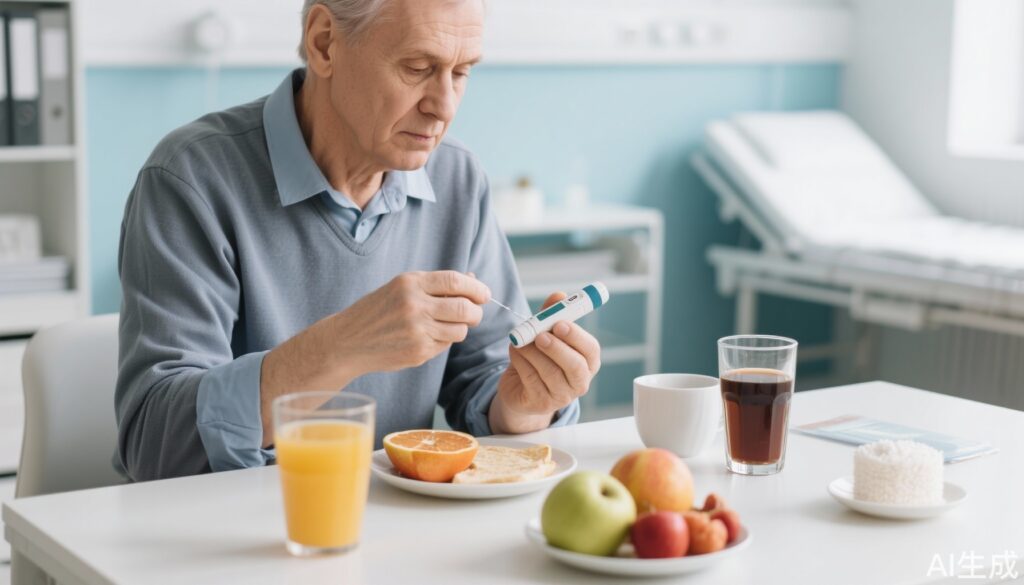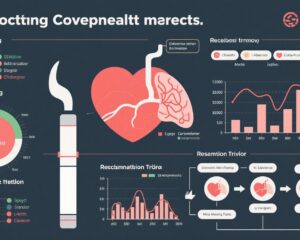Highlight
1. Consumption of 100% orange juice, whole orange, or sugar-sweetened beverages with a standardized breakfast does not result in significant differences in acute postprandial glucose or insulin responses in individuals with well-controlled type 2 diabetes mellitus (T2DM).
2. This randomized crossover study clarifies that, under controlled conditions, glycemic control pressure is comparable between drinking fruit juice and eating the corresponding whole fruit in this patient group.
3. The findings support the view that moderate consumption of 100% fruit juice can be integrated into breakfast meals without acute glycemic disadvantage compared with whole fruit.
4. These results challenge conventional concerns over fruit juice consumption in T2DM patients, although sugar-sweetened beverages remain less recommended due to other long-term metabolic risks.
Study Background and Disease Burden
Type 2 diabetes mellitus (T2DM) represents a significant global health burden characterized by chronic hyperglycemia and associated with increased risk of cardiovascular and metabolic complications. Dietary management is a cornerstone in T2DM treatment, aiming to minimize glycemic variability and chronic glucose exposure. Fruit consumption, an important source of vitamins and fiber, has often been advocated; however, fruit juices—especially sugar-sweetened drinks—have been scrutinized due to their higher glycemic indices and associated metabolic risks including obesity and worsening glycemic control.
Recent legislation mandates that fruit juices labeled as 100% must be unsweetened, differentiating them from sugar-sweetened beverages. Nonetheless, the metabolic responses to 100% fruit juice in patients with T2DM and its comparison with whole fruit intake remain incompletely understood.
This study addresses an important clinical question: In people with well-controlled T2DM, does consuming 100% orange juice versus equivalent whole orange pieces or a sugar-sweetened control beverage differentially impact postprandial glycemia following a standardized breakfast?
Study Design
A randomized, crossover trial design was employed involving fifteen individuals diagnosed with well-controlled type 2 diabetes (mean age 60 ± 6 years; BMI 28.7 ± 5.0 kg/m²; HbA1c 49 ± 3 mmol/mol [6.6 ± 0.3%]). Each participant underwent three test conditions in random order: consumption of a standardized high-carbohydrate breakfast served with 250 mL of 100% orange juice, 250 mL of a sugar-sweetened orange-flavored beverage, or equivalent sugar content in whole orange pieces.
Postprandial glycemic and insulinemic responses were measured over a 4-hour period using capillary glucose monitoring and serum insulin assays. The primary endpoint was the incremental area under the curve (iAUC) for glucose and insulin, representing the integrated postprandial metabolic response.
Key Findings
Primary analysis revealed no statistically significant differences in postprandial glucose or insulin responses between the three interventions. Total and incremental areas under the curve and peak values for glucose and insulin did not differ significantly (p > 0.05) when consuming whole orange pieces, 100% orange juice, or the sugar-sweetened control beverage with a high-carbohydrate breakfast.
Capillary glucose monitoring corroborated these findings, showing comparable glycemic excursions across all three test conditions.
This equivalence suggests that the physical form of fruit intake (juice versus whole fruit) does not acutely alter glycemic control in this cohort, nor does inclusion of sugar-sweetened beverage result in an acute glycemic disadvantage when consumed with a standardized meal, under controlled conditions.
However, it is important to emphasize that this trial investigated acute responses to a single meal, and does not address longer-term metabolic impacts or other clinical outcomes.
Expert Commentary
This study provides valuable insights into the metabolic effects of fruit juice versus whole fruit in type 2 diabetes, contributing to nuanced dietary recommendations. The similar acute glycemic responses challenge the simplistic view that liquid forms of fruit inherently cause greater glycemic excursions than whole fruit.
Nevertheless, clinicians should interpret these findings with caution. Longer-term responses, effects on satiety, insulin sensitivity, and cardiovascular risk were not evaluated. Furthermore, the study population had well-controlled diabetes, which may limit generalizability to patients with poor glycemic control or with more complex comorbidities.
Mechanistically, the comparable sugar content and nutrient profile in all test products might explain this parity, suggesting that other factors such as dose, timing, and co-ingestion with complex meals play important roles.
Current diabetes management guidelines emphasize minimizing added sugars and prioritizing whole foods, but these results support flexibility and personalization in diet planning.
Conclusion
In individuals with well-controlled type 2 diabetes, acute glycemic control following breakfast is not significantly affected by consumption of 100% orange juice compared to whole orange pieces or a sugar-sweetened beverage with equivalent sugar content. This evidence supports the moderate inclusion of 100% fruit juices in breakfast meals without undue acute glycemic penalty.
Future research should investigate longer-term impacts on glycemic variability, metabolic health, and clinical endpoints, as well as include more diverse diabetic populations.
References
Verboven K, Van Ryckeghem L, Schweiggert R, Steingass CB, Gojevic T, Ruxton CHS, Hansen D. Acute glycaemic response of orange juice consumption with breakfast in individuals with type 2 diabetes: a randomized cross-over trial. Nutr Diabetes. 2025 Jul 9;15(1):31. doi: 10.1038/s41387-025-00385-8. PMID: 40628708; PMCID: PMC12238372.


